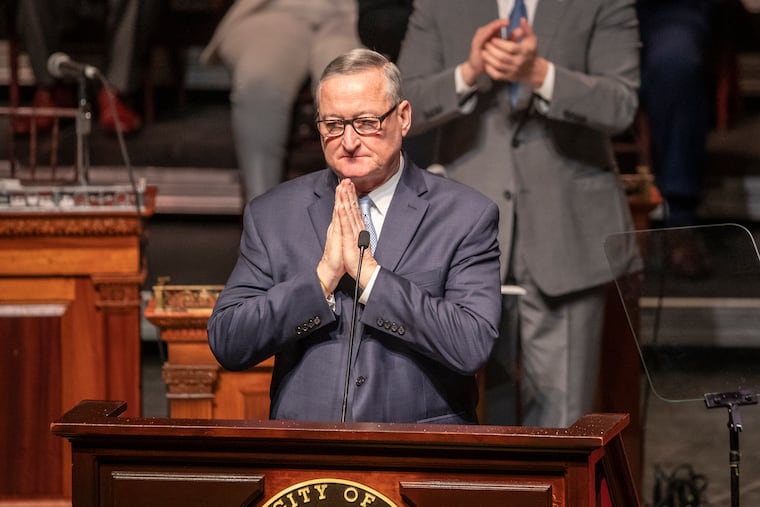Philadelphia Mayor Jim Kenney’s second term is underway. Here’s what he promises to do in the next four years.
Mayor Jim Kenney began his second term in office, touting progress made over the last four years and promising to confront gun violence and other stubborn challenges that he blamed on decades of "economic and racial inequality.”

Mayor Jim Kenney began his second term in office Monday, touting progress made over the last four years and promising to confront gun violence and other stubborn challenges that he blamed on decades of "economic and racial inequality.”
The administration’s top priority, he said, will be reducing gun violence. In 2019, the city had the highest number of homicides since 2007.
Working with incoming Police Commissioner Danielle Outlaw, whom Kenney appointed last week, the mayor wants to lower the number of homicides in the city by 30% from the 353 recorded in 2018. He also wants the city to continue instituting criminal justice reform measures with the goal of halving the jail population.
“Talking to the moms and dads, brothers and sisters, aunts and uncles, of the young men and women cut down on the streets of Philadelphia has left deep scars on our communities, and, frankly, on me personally," Kenney said in an inauguration speech at the Met Philadelphia on North Broad Street.
His cakewalk 2019 reelection meant that he barely had to campaign or articulate his goals for a second term before Monday.
Few of the mayor’s second-term agenda items, however, match the ambition of some of his first-term accomplishments, such as returning the School District to local control or enacting the sweetened beverage tax to fund pre-K, community schools, and renovations of recreation centers, parks, and libraries.
All 17 members of City Council, four of whom took office for the first time, were also sworn in Monday morning for four-year terms. And the ceremony included oaths of office for Register of Wills Tracey L. Gordon and Sheriff Rochelle Bilal — who both unseated longtime incumbents in Democratic primary elections last year.
Council President Darrell L. Clarke, reelected to a third term in the top leadership post, said lawmakers would focus on lifting 100,000 Philadelphia residents out of poverty by 2024. “This is our moonshot moment,” he said, reminding the audience of the ambition, and success, of the Apollo space program in 1969.
There also was a rare shakeup in leadership on Council: Cherelle L. Parker unseated Bobby Henon as Democratic majority leader.
The vote, finalized during Monday morning’s inauguration ceremony, is the sharpest rebuke yet of Henon from his colleagues since he and other officials with the local Electricians union were indicted on federal corruption and fraud charges last year.
» READ MORE: Philadelphia City Council gets a leadership shakeup, with Cherelle Parker beating Bobby Henon as majority leader
After Kenney took the oath of office on a Bible held by his mother, Barbara, he said his focus on education and other issues in his second term will also be part of an effort to reduce gun violence in the city.
“I can’t control the guns, and the federal government and state won’t do anything about it," he told reporters after the inauguration ceremony. "So we can control education investment, we can control job training and job access, and that’s where we’re going.”
On education, Kenney plans to continue to increase funding for the School District and to focus on making Community College of Philadelphia more affordable and accessible through a “last dollar” model that would help students with the shortfall between their contributions and financial aid awards.
On transportation, the mayor wants to add 40 miles of protected bike lanes on city streets and to support the planned redesign of SEPTA’s bus routes.
And Kenney vowed to begin street sweeping in every neighborhood by the end of his second term, reiterating a campaign promise he made in his first run that has proved to be a complicated one to carry out.
To address climate change, Kenney plans to hire a “chief resilience officer," who will identify potential threats to public and private entities in the city caused by global warming.
Kenney began his term by signing two executive orders. One created the Office of Children and Families. Cynthia Figueroa, who was previously commissioner of the Department of Human Services, was appointed as deputy mayor for the Office of Children and Families.
Figueroa will serve as a member of the mayor’s cabinet and focus on improving coordination among agencies that serve children. She will oversee the Department of Human Services, the community schools program, and pre-K. The latter two functions were previously part of the Mayor’s Office of Education, which will now focus on working with the School District and CCP. The new office also will work closely with the School District.
“All of our children deserve to grow up healthy in safe, loving homes and prepared for the future,” Kenney said Monday afternoon as he signed the executive order in City Hall. “We know that unfortunately not all children have that opportunity."
The other executive order requires diversity training in city departments and the creation of “racial equity plans” for every city agency, evaluating whether any services are administered in a discriminatory way.
“For example," Kenney said, “we’ll reform burdensome fines and fees to bring fairness to more residents, and we’ll provide more support to returning citizens so they can contribute to our society in a meaningful way.”